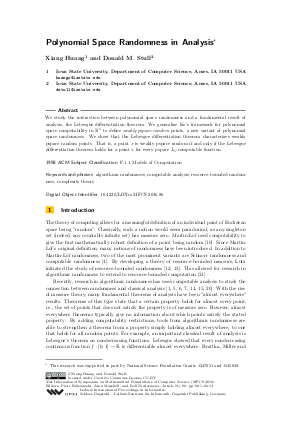Polynomial Space Randomness in Analysis
Authors Xiang Huang, Donald M. Stull
-
Part of:
Volume:
41st International Symposium on Mathematical Foundations of Computer Science (MFCS 2016)
Part of: Series: Leibniz International Proceedings in Informatics (LIPIcs)
Part of: Conference: Mathematical Foundations of Computer Science (MFCS) - License:
 Creative Commons Attribution 3.0 Unported license
Creative Commons Attribution 3.0 Unported license
- Publication Date: 2016-08-19
File

PDF
LIPIcs.MFCS.2016.86.pdf
- Filesize: 442 kB
- 13 pages
Document Identifiers
Subject Classification
Keywords
- algorithmic randomness
- computable analysis
- resource-bounded randomness
- complexity theory
Metrics
- Access Statistics
-
Total Accesses (updated on a weekly basis)
0PDF Downloads0Metadata Views
Abstract
We study the interaction between polynomial space randomness and a fundamental result of analysis, the Lebesgue differentiation theorem. We generalize Ko's framework for polynomial space computability in R^n to define weakly pspace-random points, a new variant of polynomial space randomness. We show that the Lebesgue differentiation theorem characterizes weakly pspace random points. That is, a point x is weakly pspace random if and only if the Lebesgue differentiation theorem holds for a point x for every pspace L_1-computable function.
Cite As Get BibTex
Xiang Huang and Donald M. Stull. Polynomial Space Randomness in Analysis. In 41st International Symposium on Mathematical Foundations of Computer Science (MFCS 2016). Leibniz International Proceedings in Informatics (LIPIcs), Volume 58, pp. 86:1-86:13, Schloss Dagstuhl – Leibniz-Zentrum für Informatik (2016)
https://doi.org/10.4230/LIPIcs.MFCS.2016.86
BibTex
@InProceedings{huang_et_al:LIPIcs.MFCS.2016.86,
author = {Huang, Xiang and Stull, Donald M.},
title = {{Polynomial Space Randomness in Analysis}},
booktitle = {41st International Symposium on Mathematical Foundations of Computer Science (MFCS 2016)},
pages = {86:1--86:13},
series = {Leibniz International Proceedings in Informatics (LIPIcs)},
ISBN = {978-3-95977-016-3},
ISSN = {1868-8969},
year = {2016},
volume = {58},
editor = {Faliszewski, Piotr and Muscholl, Anca and Niedermeier, Rolf},
publisher = {Schloss Dagstuhl -- Leibniz-Zentrum f{\"u}r Informatik},
address = {Dagstuhl, Germany},
URL = {https://drops.dagstuhl.de/entities/document/10.4230/LIPIcs.MFCS.2016.86},
URN = {urn:nbn:de:0030-drops-64943},
doi = {10.4230/LIPIcs.MFCS.2016.86},
annote = {Keywords: algorithmic randomness, computable analysis, resource-bounded randomness, complexity theory}
}
